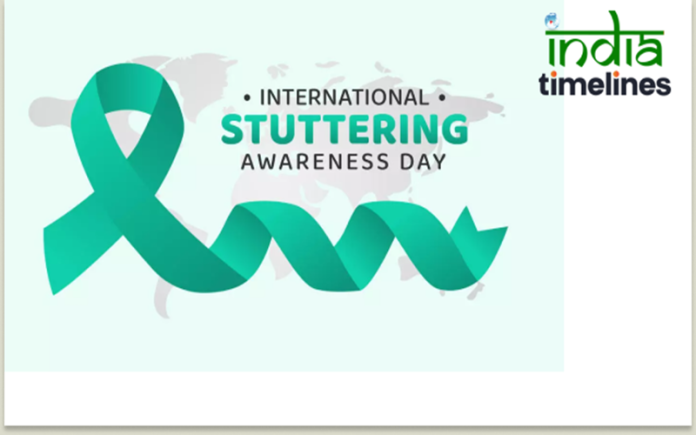
International Stuttering Awareness Day (ISAD) is observed annually on October 22, serving as a significant platform for raising awareness about stuttering and its impact on individuals’ lives. This day aims to foster understanding, encourage research, and promote effective strategies to support those who stutter. In 2024, ISAD will focus on the theme of empathy and inclusivity, urging society to embrace and support individuals with speech disfluency. This article explores the significance of ISAD, the nature of stuttering, its effects on individuals, and ways to promote awareness and support.
Understanding Stuttering
Stuttering, also known as stammering, is a complex communication disorder characterized by disruptions in the normal flow of speech. These disruptions may manifest as repetitions of sounds, syllables, or words, prolonged sounds, or involuntary pauses. Stuttering affects people of all ages, but it often begins in childhood, with many children outgrowing it as they develop their speech and language skills. However, for some, stuttering can persist into adulthood, leading to various emotional and psychological challenges.
1. Types of Stuttering
- Developmental Stuttering: This is the most common form of stuttering, usually seen in children. It often arises as they learn to speak and develop their language skills. Developmental stuttering may improve over time but can also persist into adolescence or adulthood.
- Neurogenic Stuttering: This type occurs due to neurological conditions or injuries that affect the brain’s ability to control speech. It can occur after a stroke, traumatic brain injury, or other neurological disorders.
- Psychogenic Stuttering: This form is associated with psychological factors, such as anxiety, trauma, or emotional distress. It may develop in response to stressful situations or traumatic experiences.
2. Causes of Stuttering
The exact causes of stuttering are not fully understood, but several factors may contribute, including:
- Genetics: Research indicates that stuttering may run in families, suggesting a genetic component.
- Brain Function: Studies have shown differences in brain structure and function among individuals who stutter, particularly in areas related to speech production and language processing.
- Environmental Factors: Stressful or demanding environments can exacerbate stuttering. Additionally, children who are under pressure to communicate effectively may experience increased disfluency.
- Personality Traits: Individuals with certain personality traits, such as high levels of anxiety or perfectionism, may be more prone to stuttering.
The Impact of Stuttering
Stuttering can have a profound effect on individuals, impacting their self-esteem, social interactions, and overall quality of life. People who stutter may face:
- Social Isolation: Fear of judgment or ridicule may lead individuals to avoid social situations, resulting in feelings of loneliness and isolation.
- Emotional Distress: Stuttering can cause anxiety, frustration, and embarrassment, affecting mental health and well-being.
- Academic Challenges: Students who stutter may experience difficulties in school, including challenges with oral presentations and class participation.
- Employment Barriers: In professional settings, individuals may encounter obstacles when communicating effectively, potentially impacting job performance and career advancement.
The Importance of International Stuttering Awareness Day
ISAD provides a crucial opportunity to raise awareness about stuttering, educate the public, and advocate for those who stutter. By fostering understanding and empathy, ISAD aims to create a more inclusive society that supports individuals with speech disfluency.
- Objectives of ISAD
- Raise Awareness: ISAD seeks to inform the public about what stuttering is, its prevalence, and its impact on individuals.
- Promote Understanding: By educating society about stuttering, ISAD aims to reduce stigma and misconceptions surrounding the disorder.
- Support Advocacy: The day encourages individuals and organizations to advocate for the rights of people who stutter and promote policies that support their needs.
- Encourage Research: ISAD highlights the importance of ongoing research into the causes, treatment, and management of stuttering.
- History of ISAD
International Stuttering Awareness Day was first established in 1998 by the International Stuttering Association (ISA). Since then, it has grown into a global event, with various activities, workshops, and campaigns organized to promote awareness and support for those who stutter. Each year, ISAD focuses on a specific theme that reflects the current challenges and needs of the stuttering community.
How to Support Stuttering Awareness
- Educate Yourself and Others: Understanding stuttering and its effects is crucial in promoting awareness. Share information with friends, family, and colleagues to help dispel myths and stereotypes.
- Participate in ISAD Events: Join local and online events organized for ISAD. These may include workshops, seminars, or community gatherings aimed at raising awareness.
- Advocate for Inclusivity: Support policies that promote inclusivity in schools, workplaces, and public spaces. Encourage organizations to create environments where individuals who stutter feel safe and supported.
- Support Research Initiatives: Contribute to or participate in research initiatives aimed at understanding and treating stuttering. Increased funding and support for research can lead to better treatments and support strategies.
- Share Personal Stories: If you or someone you know stutters, consider sharing personal experiences. Personal stories can help raise awareness and foster understanding.
- Practice Empathy: Approach conversations with individuals who stutter with patience and empathy. Avoid interrupting or finishing their sentences; instead, give them the space to communicate at their own pace.
Promoting Inclusivity and Empathy
For ISAD 2024, the emphasis on empathy and inclusivity is crucial in creating an environment where individuals who stutter feel accepted and valued. Here are some practical ways to promote these values:
1. In Educational Settings
- Incorporate Stuttering Awareness Programs: Schools can implement programs to educate students about stuttering, fostering a culture of acceptance and understanding.
- Create Safe Spaces: Encourage open discussions about communication difficulties, allowing students to share their experiences without fear of judgment.
- Provide Resources for Teachers: Equip educators with tools and strategies to support students who stutter, promoting a positive learning environment.
2. In the Workplace
- Implement Training Programs: Organizations can provide training on communication challenges, emphasizing the importance of empathy and patience in professional interactions.
- Promote Open Communication: Create a culture where employees feel comfortable discussing their communication difficulties and seeking support when needed.
- Celebrate Diversity: Acknowledge and celebrate the diverse communication styles within the workplace, recognizing that stuttering is just one aspect of a person’s identity.
3. In the Community
- Host Awareness Campaigns: Community organizations can organize campaigns to raise awareness about stuttering, using various platforms such as social media, local events, and workshops.
- Encourage Inclusivity in Public Spaces: Advocate for public spaces to be designed with inclusivity in mind, allowing individuals with communication challenges to feel comfortable and supported.
- Support Local Stuttering Organizations: Collaborate with local organizations that focus on supporting individuals who stutter, offering resources, workshops, and advocacy.
India Time Lines
Conclusion
International Stuttering Awareness Day 2024 presents an invaluable opportunity to raise awareness, promote understanding, and support individuals who stutter. By fostering empathy and inclusivity, society can create an environment where people with speech disfluency are accepted, valued, and empowered. Together, we can work towards breaking down barriers, dispelling myths, and celebrating the diverse ways in which we communicate. Through education, advocacy, and support, we can make a meaningful difference in the lives of those who stutter and promote a world where everyone can express themselves freely and confidently.




































toobit exchange
I got what you intend, thanks for posting.Woh I am happy to find this website through google.